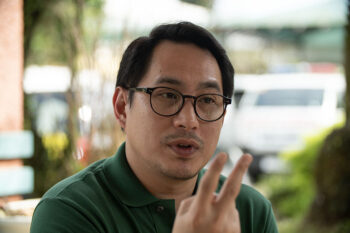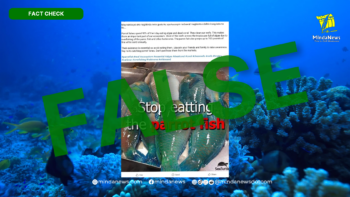DAVAO CITY (MindaNews / 22 January) — What are the questions that the youth of today, 30 years removed from directly experiencing Martial Law, want to know about that dark period in our history?
I had the opportunity to ask and listen to young people from Davao when I got invited by the Assumption School of Davao chapter of the Junior Social Workers Association of the Philippines to speak on behalf of Konsyensya Dabaw at an event titled “Recounting and Retelling Horrors of Martial Rule: A Story Forum” last December 2016.
Three other invited panelists shared stories of how they stood for democracy and peoples’ rights during the Marcos dictatorship, and of getting incarcerated, and tortured by the forces of authoritarianism.
At the end of my slot I asked the participants to write down their answers to two questions: the key questions they wanted answered about Martial Law; and what they think were effective ways of answering the questions. I also asked them to indicate their age and sex. I thought that Konsyensya Dabaw and other groups could use the results of the exercise to further enhance communication and education efforts about Martial Law.
There were 50 responses from 41 participants, of which 34 were females, and four males. Three did not specify their sex. Those that indicated their age were within the 18 to 21 age bracket. The organizers had also invited other students outside of their club so it was not necessarily a homogenous group.
The most common questions were related to the effects of Martial Law; those who responded wanted to know not only negative but also positive consequences. The second most frequent type of questions were on the reasons behind Martial Law declaration, including about the vested interests of the Marcos family. The fourth most common questions were on Marcos and being a hero.
There was also interest on the basic details of Martial Law, its relevance to those who were not yet born when it happened, the likelihood of it happening again, and the possibility of punishing those responsible for it.
Two respondents wanted to know about available recourses should Martial Law be imposed. One wanted to know if the Courts could suspend its declaration. Another asked if other countries could help once Martial Law is declared.
I thought about these questions again when news broke out that President Rodrigo Duterte had talked about declaring Martial Law to address the illegal drugs problem in his talk before the Chamber of Commerce on January 14 in Davao.
In response to a question during the December Forum on whether Martial Law could be declared again, I cited that Pres. Duterte had mentioned suspending the habeas corpus November 15 last year in light of “rebellion in Mindanao, terrorists in Jolo, Sulu,” but that by December 1, it seemed he had dismissed it saying “”Kung manggaling sa akin ang martial law, kalokohan iyan. Nag-martial law nga tayo noon, anong nangyari? Gumaling ba ang buhay natin? Hanggang ngayon wala.”
But where quoting the words of those in authority used to be a way of laying uncertainty to rest, and resolving contentious issues, in the case of Pres. Duterte, this obviously does not apply.
If his statements in a press conference or public address setting could not be a reliable source of policy guidance, would it be a different case if he were to directly answer questions posed to him face to face by young people?
Minors have been affected by the anti-illegal drugs drive which has become the latest justification for tough talks about Martial Law.
An article released by the Philippine Center for Investigative Journalism (PCIJ) in September 2016 cited data from the Philippine National Police’s Women and Children Protection Center (PNP WCPC) that showed that in the first two months of the Duterte administration, among those who surrendered (or in police parlance voluntarily submitted for reform) were 20,584 minors. Of these minors, 1,988 were from the Davao Region, but the highest numbers came from Central Visayas and Northern Mindanao.
Towards end of August 2016, a reported 673,978 drug users and pushers had surrendered via Oplan Tokhang according to PNP chief Ronald dela Rosa.
If he does declare Martial Law, what would Pres. Duterte say to the youth of Davao City to explain himself and his actions?
What would he answer if asked whether Martial Law was his last and only option to deal with illegal drugs? How would he respond to the question whether obtaining power and money were part of the Martial Law game plan?
Would Pres. Duterte care enough to provide coherent explanations to the segment of society in whose name and for whose future the campaign against drugs is being fought, but who have also been victimized by it?
Or would, like the rest of us, the youth end up feeling that, instead of being engaged in earnest discourse in response to legitimate questions, they are only part of a test audience reacting to statements that really are just mind games and part of condition creation.
(MindaViews is the opinion section of MindaNews. Mags Z. Maglana is a Mindanawon who has worked in various capacities over the past 30 years for peace, good governance, sustainable development, and the promotion of human rights. Maglana is one of the convenors of Konsyensya Dabaw. Please email feedback to magszmaglana@gmail.com)







